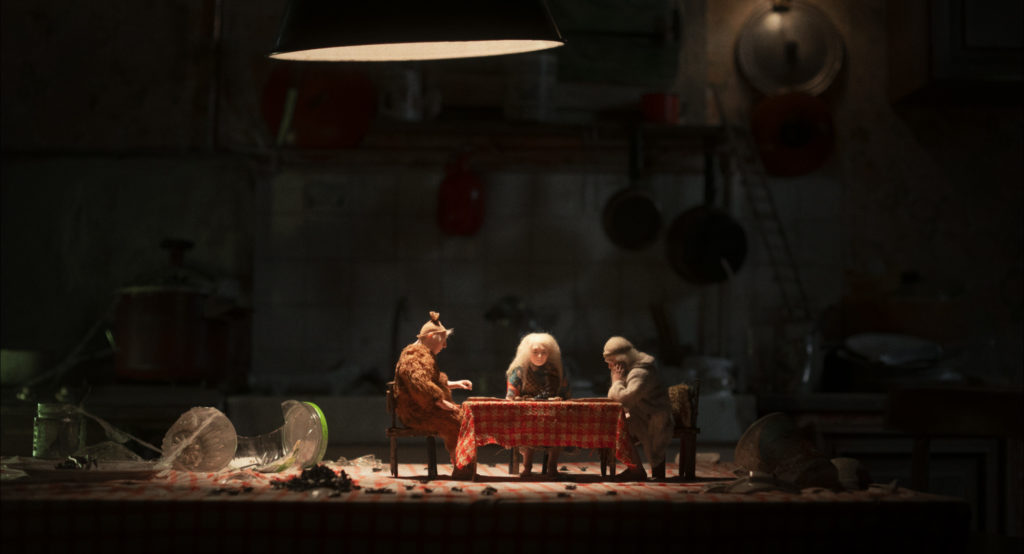Nina Gantz’s short film Wander to Wonder won the International Audience Award at the Glasgow Short Film Festival 2024. This leaves no doubt that the 14 minute short deeply impacted its viewers. But in what way?
Wander to Wonder is a puppet stop-motion animation from the Netherlands, written by Daan Bakker, Stienette Bosklopper, Simon Cartwright, and Nina Gantz. Protagonists Mary (voiced by Amanda Lawrence), Billybud (Terence Dunn), and Fumbleton (Toby Jones), are the stars of a 1980s television series for children, hosted by the quirky vest-wearing Uncle Gilly. They are content and cared for, until Gilly dies, and like a deranged version of The Borrowers, they must employ strange methods to stay alive and even stranger ones to stay sane.

The film was shown in two different programmes: the international competition programme Bill Douglas Award 3: Between Every Imagined Present, and the non-competitive For Shorts and Giggles. As a black comedy about the fears of the unknown, it sat comfortably in the contrasting categories.
Between Every Imagined Present collated films about personal and collective memory, pondering the past and looking ahead to the future. Alongside Wander to Wonder were films about a grieving wife, tales of solidarity in an 80s Parisian nightclub for Arabs, memories from an Egyptian refugee camp, and children left to fend for themselves, who are only shown glimpses of the outside world.
These films, all sincere and deeply contemplative, enhanced the drama of Wander To Wonder. Gantz has created such an unnerving atmosphere through imagery: the stiff legs of a loved one entombed in scraps of old fan mail, wet globs of disfigured papier-mâché figures (Mary’s panic project), and their dilapidated fur costumes, once beautiful, now torn and matted.
Mary’s desperation to cling to the past to postpone her grief and struggle against the future has disastrous consequences. She lashes out at her companions over the disappearance of the last gherkin, and her attempts to recreate the show result in grainy camcorder footage of her frantic unravelling.
Screened again only hours later, the reaction couldn’t have been more different.
For Shorts and Giggles is a GSFF regular that celebrates the best comedic entries to the festival. Before Wander To Wonder, we watched a Mr Nice Guy turned bad, the dogged pursuit of an athletically inept suit failing to kick balls back to their owners, and an animated internal monologue that director Harry Plowden swears is not autobiographical.
After watching these shorts and the rest of the category, the audience was primed for belly-laughs.

The lingering shot of a singular crispy fly plated up for dinner, and the following warning from Mary not to eat the insects, received a room-wide titter that hadn’t been heard during the competition screening. When Billybud accidently starts a fire, the room is scorched black, and everything they’ve ever known is turned to ash. The oven door creaks open to reveal the trio covered in soot, and the Shorts & Giggles audience laugh!
Through a comedic lens, the tragedy is transformed, and the dark humour dominates. If you have an expectation to be shown something humorous, are you more likely to laugh? Having first seen Wander To Wonder within a collection of stories that were so melancholic, it was impossible to shake the ominous feeling that the wide-eyed masks and their permanently gaping jaws inspired.
The Glasgow Short Film Festival’s curation of programmes tied distinctive films by talented creatives together by expertly considering mood, genre, and theme. The different reactions to Wander To Wonder show how important the process of programming is and how greatly it can impact viewers. While both audiences probably left with very different interpretations of the film, its haunting plot and mastery of animation can be agreed upon by all.